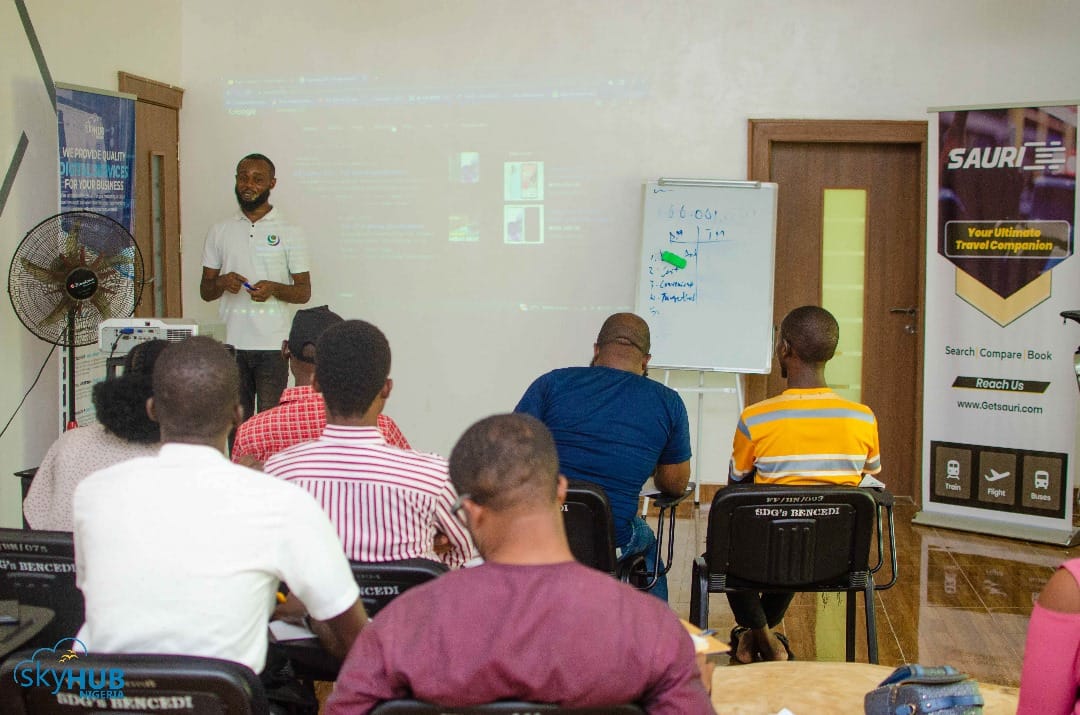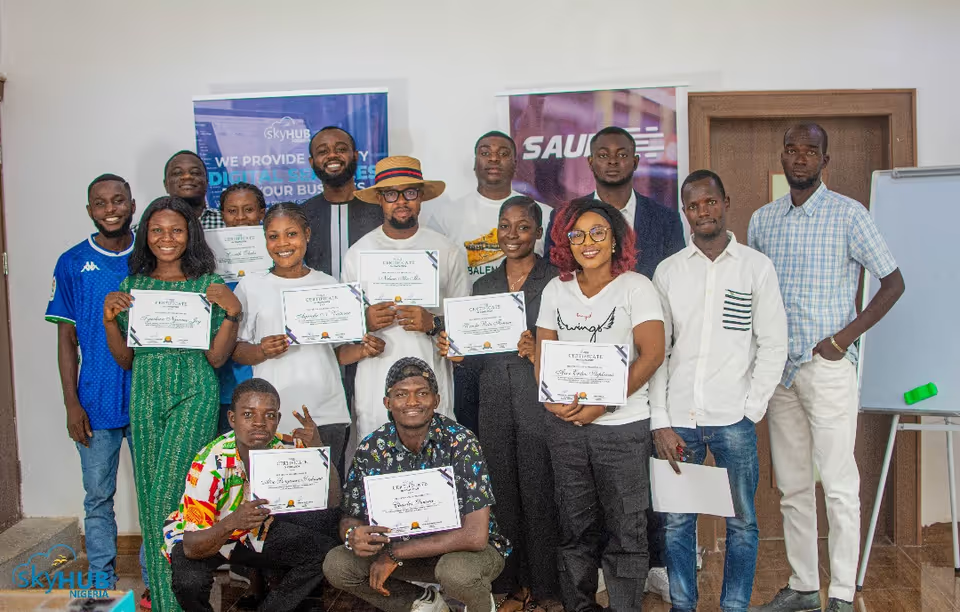Solomon Kershima Yateghtegh, founder of Makurdi-based creative and digital training hub SKYHUB, has been a champion of digital skills training for young people in Northern Nigeria. Since SKYHUB founding in 2018, Yateghtegh and his team have empowered over 15,000 individuals with these skills.
Going beyond independent training, SKYHUB has collaborated with organisations like Google Digital Skills for Africa, Meta Business for SMEs, and the Nigerian government’s NPower tech skills programme. “Training is at the heart of everything we do,” Yateghtegh told Bendada.com.
While the COVID-19 lockdowns initially disrupted their primarily physical training programs, SKYHUB quickly adapted, resuming basic and advanced digital skills training once restrictions eased. According to Yateghtegh, “Education is unending, and the need for knowledge is increasingly important, especially because of technological advancement.”
This emphasis on digital skills development aligns perfectly with a recent government initiative. In October 2023, the Nigerian government launched the ambitious “3 Million Tech Talents” (3MTT) programme, aiming to equip millions of young Nigerians with essential tech skills. Inspired by the lack of digitally skilled youth in their home state of Benue, SKYHUB saw an opportunity and applied to become a training provider for the programme.
Yateghtegh’s decision paid off. Just a week before the programme’s commencement, he received an unexpected call from the 3MTT team. “I had nearly given up hope,” he recalled, expressing his surprise at their selection.
SKYHUB became one of 120 organisations chosen to implement the programme’s pilot phase. Notably, they were one of just four selected from Benue state.
Yateghtegh’s team was assigned 355 fellows for the first cohort but only 260 completed the three-month program, earning their certifications in AI/machine learning, data science, cyber security and software development. “The fellows were spread across the courses,” he said.
Winner Uche, a 16-year-old electrical and electronics student at the Joseph Sarwuan Tarka University of Agriculture, Makurdi enrolled in the 3MTT software development track. During the March edition of the 3MTT Talent Showcase, a program initiative allowing fellows to showcase their skills, Uche presented an innovative attendance management system for the 3MTT program itself. His ingenuity placed him among the top 50 winners nationwide, earning him a laptop prize from the federal government.
Here’s Winner Uche, a 16-year-old #3MTTNigeria software development fellow who received his winning prize (a laptop) for the March edition of the Talent Showcase.
His appreciation goes to the Honorable Minister of CIDE, @bosuntijani, the @3MTTNigeria and @SKYHubNigeria #3MTT pic.twitter.com/EX2lcxkPdR
— SKYHub Nigeria (@SKYHubNigeria) April 24, 2024
For Kershima Yateghtegh, Winner Uche’s victory, alongside the success of three other fellows under his team’s guidance at the Talent Showcase, serves as a validation of SKY Hub’s work as a training provider. “About 6% of the fellows have received internship roles,” he said.
Uche’s story and those of other fellows are truly inspiring, but the program wasn’t without its hurdles. Benue state’s digital literacy rate necessitated adjustments. SKY Hub’s team had to adapt their curriculum, offering crash courses on basic digital skills before diving into advanced topics. Additionally, unreliable internet connectivity and power outages occasionally disrupted programme activities.
Yateghtegh conceded, “Access to computers was another hurdle. Not all fellows had personal laptops, and we had a limited supply.” SKY Hub is actively expanding its computer inventory to ensure all participants in the next three cohorts have the necessary tools for success. He believes that the 3MTT programme will contribute to the future of productivity and innovation in the country.

‘Bosun Tijani, Nigeria’s minister for communication, innovation and digital economy, and the driving force behind the 3MTT program, shares this optimism. “By the time we’re done,” he said. “there won’t be a bigger tech talent nation.”
The need is significant. World Bank data from 2021 indicates that over half of Nigeria’s 200 million citizens lack digital skills. The 3MTT program, alongside efforts from private sector players like edtech startups Alt School Africa, Utiva and Stutern, aims to bridge this gap. The overwhelming response to 3MTT is a testament to its importance – over one million Nigerians applied for the program.
SKYHUB’s experience further underscores the program’s potential. Yateghtegh observed significant improvement among fellows who lacked basic digital skills when they entered the program. “They were performing much better by the end,” he shared.
“Sub-national efforts are crucial in Benue”
Yateghtegh’s experience with the 3MTT program, combined with his months of leading digital skills initiatives across Northern Nigeria, particularly Benue state, has solidified his belief in the importance of government involvement in fostering tech talent.
“A key challenge is the limited participation of the Benue state government in driving tech talent development,” he explained. “Collaboration with tech hubs and startups on impactful programs could significantly boost the state’s long-term tech sustainability.”
Looking at neighbouring states, Benue could find inspiration in similar initiatives. Plateau state’s Code Plateau program and Kaduna State’s Click On Kaduna programme, for example, offer valuable models.
Kaduna has gone a step further by supporting the development of Kaduna Technology City, which houses CoLab, a pioneering tech hub in Northern Nigeria and incubator for fintech startup Sudo Africa. Plateau also recently signed a partnership with Wyclef Jean to build a large-scale tech hub.
While Plateau’s efforts are promising, it’s important to learn from setbacks. The state government’s halt of the Code Plateau programme, which had trained over 3,000 youths, underscores the importance of effective partnerships in sustaining such initiatives.
Get passive updates on African tech & startups
View and choose the stories to interact with on our WhatsApp Channel
Explore




